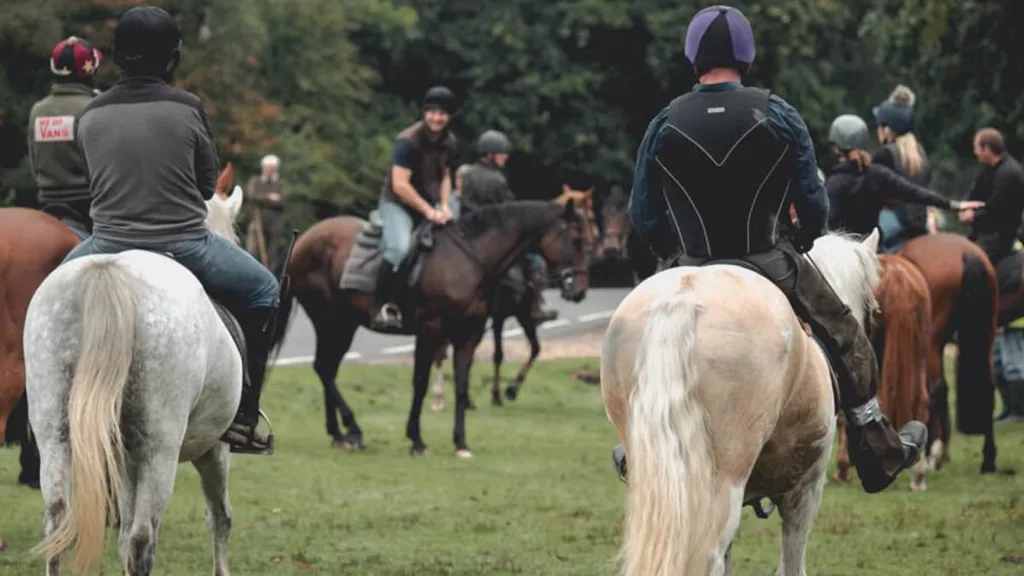More than 700 'commoners' with ancient grazing rights in a national park are seeking to be recognised by the government as a 'national minority'.
Commoners in Hampshire's New Forest have existed for more than a thousand years and want to be considered a people in their own right - like the Scots, Welsh and Cornish.
They say the proposal to grant them 'national minority status' would give them a stronger voice in local government and help preserve cultural practices vital to the ecosystem of the Forest.
Among the unique traditions associated with the historic group are the roaming of pigs during 'pannage' season, the round up of the area's famous ponies and the point-to-point race on Boxing Day.
The ancient tradition of commoning dates back from before the days when William the Conqueror made the area his private hunting reserve and imposed strict laws on the locals. In return, they were given the rights to graze their animals on the 'common' - the land now known as the New Forest.
The rights of Commoners are protected and regulated by the ancient Verderers' Court, which dates back to the third century and meets once a month to discuss ongoing issues in the New Forest.
They want the government to officially declare them a minority to ensure their influence continues.
The move has been sparked by concerns over the impact of an impending local government reorganisation that could see the New Forest District Council abolished and residents instead served by an 'urban-dominated' authority which also looks after Southampton and Eastleigh.
Andrew Parry-Norton, chair of the Commoners' Defence Association, explained there are 720 people with the unique grazing rights but most are in their 70s.
'What it gives us is that for any decision that will be made about the Forest we have to get a say. If we get this we have protection.
'The Commoners are a small minority group but we have a huge impact on the forest and everything that comes with it.
'We are facing uncertain times with funding, with local government reorganisation, I think now is the right time to try.
'All the way through history you have had commoners in the New Forest, we are a very close knit community.'
National minority status gives certain populations a greater say in public decision making and a right to freely express their culture with a corresponding obligation by the government to preserve that culture.
The rights and responsibilities are defined by the Council of Europe's Framework Convention for the Protection of National Minorities, a treaty the United Kingdom signed in 1995.
However, Mr Parry-Norton was clear that the group do not have aspirations of New Forest independence, unlike the other national minorities of Cornwall, Wales, and Scotland.
'We are still part of everybody; the Forest is here for everybody,' he said.
'We know that but what we want to do is preserve the community and traditions that everyone comes to look at.'
'Without the Commoners you don't have a forest.'
The process was kickstarted by Brice Stratford, a writer and historian who sits on the board of the New Forest National Park Authority.
He is not a Commoner but became passionate about them after studying folklore around the world and seeing connections between his home and other groups such as the Maasai tribe in Kenya.
Mr Stratford said: 'It was only when I left the New Forest I came to understand how rare it is.'
'The preservation of the New Forest Commoners is not just important from a heritage perspective; the New Forest is an internationally important ecologically.'
'It is maintained according to the traditions of the Commoners; if we lose their way of life we lose the New Forest.'
'1016 is the first hard evidence of the Commoners' way of life existing; there is an unbroken lineage right through to today; the idea we might lose this is terrifying to me.'
So far the Commoners' Defence Association, working with Mr Stratford, have got a letter of recognition from New Forest District Council and confirmation from the Commoners themselves that they self-identify with that term.
The group are now gathering more evidence in order to persuade the government to back their claim. Announcing a small survey earlier this month which had the aim of understanding just how many people identify as Commoners in the New Forest, Mr Parry Norton said: 'Commoning is a way of life deeply tied to the landscape, with roots going back hundreds of years. But unless we're counted we are at risk of being overlooked.'
On Monday CDA announced this year's pannage season will run from September 15 to November 28. The practice sees commoners turning out domestic pigs into the woodland to forage for fallen acorns, beech mast, chestnut and other nuts and plays a vital role in maintaining the ecological balance of the forest.
The forest's famous ponies have roamed its 219 square miles for 2,000 years.
There are currently around 5,000 in the forest. While wild in the sense they can roam freely, they are owned by the Commoners.
The Hampshire forest was designated a National Park in 2005 in order to protect the landscape and preserve it for the nation to enjoy for generations to come.
In 2022 Ulster Scots became the most recent recognised national minority within the UK, following the Cornish in 2014 and before that Wales, Scotland, and Northern Ireland.
For Cornwall it was a nine-year process to achieve the legal recognition.
